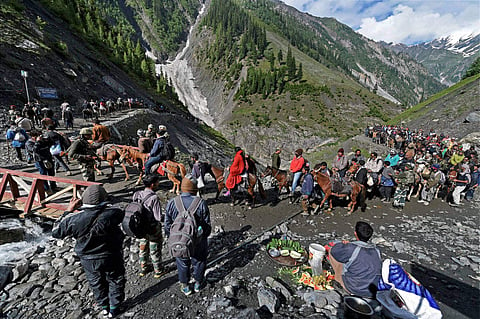

SRINAGAR: Even as the tourists are trickling back to Pahalgam tourist destination in Jammu and Kashmir after April 22 terror attack, the pony walas continue to be workless, their livelihood has been crippled and their future is uncertain.
J&K Pony wala Association president Waheed Ahmed said tourists returning to Pahalgam is a good sign and every tourist stakeholder whether it be a hotelier, restaurant and eateries, cab drivers, etc are going to benefit from it.
The tourist sector has been badly hit after April 22 terror attack at Baisaran, Pahalgam in which 25 tourists and a local pony wala Aadil Shah were killed.
The first responders to the terror attack on tourists at Baisaran were the horse riders known as pony walas and they ferried the injured on their horses, shoulder and on chairpai (cot). “All the pony walas in Pahalgam, who depend on tourism for their livelihood, have been sitting idle and without any work since April 22,” Waheed said.
He said there are about 1900 registered pony walas in Pahalgam and each of them have two horses.
“There are also unreg istered pony walas as the government has not issued licences since the last three years.”
“There are about 4000 ponywalas in Pahalgam and all have not earned a single penny in the last two months. We are living on what we had earned in the past,” Waleed said.
He said while all tourism stakeholders will benefit from return of tourists and reopening of some closed tourist destinations by the government, the pony walas would continue to remain the workless as four spots “where we are allowed to take tourists on horses are still closed”.
According to Waheed, Baisaran, Dona Valley, Kashmir Valley and Dayban in Pahalgam, where they take tourists on horses, are still closed.
He said the situation has forced many pony walas to sell livestock or take loans for survival. “We are facing an uncertain future. Some are even considering abandoning their profession if the situation does not improve soon. “
The government, he said, should reopen the closed tourist spots so that “we can earn livelihood by ferrying tourists to these tourist places”.